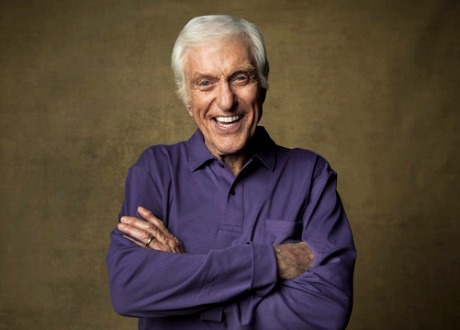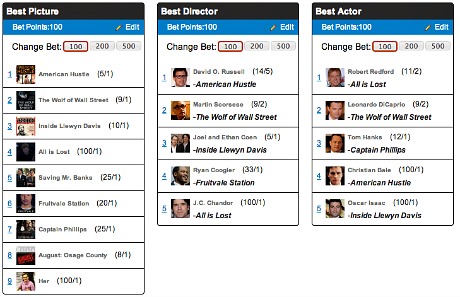The American rural right showed its racist colors when Barack Obama began running for president in ’07. Then came the Tea Party, a rural-southern-white movement that was more of a response to the Obama metaphor (multi-culturalism is the new reality, whiteys don’t exclusively run the show any more) than Obama himself. Obama has been in office five years now. Is there anyone who thinks that it’s a “whoa” to talk about the racist under-agenda in this country? Yes — The Butler director Lee Daniels. When CNN’s Piers Morgan asks if he thinks America is a more or less racist country since Obama’s election, Daniels says, “Wow…that’s a powerful question!”
Perv Entrapment
A little while ago Awards Daily‘s Sasha Stone mentioned a form of pushback that I’m calling the Perv Retort. If you’re a straight male columnist and you’ve gotten really riled up by the performance of a young and beautiful actress (like Blue Is The Warmest Color‘s Adele Exarchopoulos), it’ll be presumed by the community at large that you’re expressing a form of libidinal arousal and are therefore off-balance to some extent. Therefore your opinion has to be at least partly discounted because you’re probably using one hand to write and the other hand to do something else.
Same thing if you’re a gay male columnist and you’re really taken with a performance by a young male actor or a really good-looking actor in his 30s or 40s, even. It will be widely presumed that your perceptions have been colored by your day-dreaming about this actor in a certain context, and therefore your opinion about his performance being award-worthy goes right into the trash can.
Cut and Dried and Eloquent As All Get Out
Legendary crime novelist Elmore Leonard, who wrote thousands upon thousands of the most beautifully shaped sentences and digressive dialogue riffs I’ve ever read in my life and who incidentally influenced the living shit out of me, has ascended and is now hanging out with Dennis Farina. A stroke took him down. He was 87. A Detroit guy through and through. Well, a Bloomfield Hills guy. **

Leonard wrote and wrote and wrote for…what, sixty-five years straight? He never stopped working and enjoyed a brilliant hot streak during the ’80s and ’90s. And he boiled the bullshit out of his prose each and every time he put pen to paper. And he was nice enough to talk with me on the phone a few times during my reporting days with Entertainment Weekly and People and the L.A. Times Syndicate. He didn’t even hiccup when I called him “Dutch” a couple of times.
Jack Torrance in Disneyland
It was announced earlier today that Randy Moore‘s Escape From Tomorrow, the black-and-white Disneyland-meets-The Shining fantasia that played Sundance ’13, will be released commercially on 1.1 by Cinetic Media’s PDA. Pic will open theatrically as well as day-and-date on VOD. The public will see a somewhat shorter version than the one that played at Sundance. Here’s what I wrote after seeing it last January:
“Set entirely in Disneyland and shot in black-and-white, it’s basically a riff on The Shining with a vein of social criticism about pudgy, desperate, flabby-brained Americans indulging themselves with sugar, booze and fantasy while corporations control and exploit them like cattle. Is this not the central middle-class affliction of the 21st Century?
The Day My Car Caught Fire
Dick Van Dyke‘s hot-shit Jaguar caught on fire earlier today when he was driving on the 101 near Calabassas. The car melted but DVD got out okay and everything’s fine. But since when do late-model Jaguars, which are very expensive, very well-made cars, burst into flames? Van Dyke to Jaguar salesman: “And what are the chances…you know, just between you and me and the walls with no recording devices…what are the chances of this little honey bursting into flames when I’m on the freeway?” Jaguar salesman to Van Dyke: “Oh, fairly remote, I’d say. Okay, maybe a 5% chance. But that’s the chance everyone takes when they buy a Jaguar. Under the wrong conditions they can turn into tinderboxes. But hey…just concentrate on the 95% chance that it won’t happen.”

Dick Van Dyke
Brand Name Preferences
Almost every damn year the same thing happens. Journalists who’ve attended the Berlin or Cannes festivals praise a knockout performance in a small or foreign indie release (like Adele Exarchopoulos in Blue Is The Warmest Color) and mention the idea of this actor or actress being a contender on the awards circuit, and right away the middle-of-the-road handicappers say “well, that’s very nice but veteran industry types and journalists in this country are more comfortable with nominating familiar faces, and so we think that the following brand-name actresses are the likeliest contenders.”
Except by saying and writing this crap they’re perpetuating default thinking. They’re not describing industry complacency — they’re winking at it and nudging it along.
First Derby Spitballs
Gold Derby‘s Tom O’Neil has urged his Oscar experts (including myself) to make some predictions. It’s a bit silly to do this before Telluride/Toronto/New York but what the hell. Out of ten Best Picture spitballers, four are predicting David O. Russell‘s American Hustle, two are betting on Martin Scorsese‘s Wolf of Wall Street and two are predicting Alexander Payne‘s Nebraska. Except Nebraska is not going to win Best Picture — get real. It’s a good film, but on the Payne scale it’s a middle-ranger. Bruce Dern has a good shot in the Best Supporting Actor race (forget Best Actor) and it’s conceivable that June Squibb could prevail as a Best Supporting Actress contender.
Here are my transitional, know-nothing picks for the leading Best Picture, Best Director and Best Actor contenders:

51st NY Film Festival Add-Ons Mostly Rehash Cannes
As noted, first-time-anywhere showings of Paul Greengrass‘s Captain Phillips, Spike Jonze’s Her and Ben Stiller‘s The Secret Life of Walter Mitty will highlight the 51st New York Film Festival (9.27 to 10.13). But otherwise the fest will screen a slew of Cannes repeats — Joel and Ethan Coen‘s Inside Llewyn Davis, J.C. Chandor‘s All is Lost, Abdellatif Kechiche‘s Blue is the Warmest Color, Alexander Payne‘s Nebraska, Jim Jarmusch‘s Only Lovers Left Alive and James Gray‘s The Immigrant.
Other Cannes pop-outs screening in Manhattan: Claude Lanzmann‘s The Last of the Unjust, Rithy Panh’s The Missing Picture (winner of Cannes’ Un Certain Regard Prize) and Hany Abu-Assad’s Omar (winner of a Certain Regard prize).
Beltway Blood
I missed Alexandre Moors‘ Blue Caprice (9.13 theatrical, 9.17 iTunes/VOD) at last January’s Sundance Film Festival. 100% Rotten Tomatoes rating. I’d like to see it before leaving for Telluride on 8.28. Hello, Brigade Marketing — can I get a screener? “A chillingly plausible and responsibly handled attempt to dramatize the disturbing bond between the two men behind the 2002 Beltway sniper attacks” — Variety‘s Justin Chang.
Talk The Talk
There are two ways to pronounce “villa.” If you’re in Italy looking to rent a villa, it should rhyme with “Godzilla.” But if you’re managing an old-style, Spanish-flavored, pre-war hotel in Santa Barbara called the Villa Rosa Inn, you obviously need to pronounce it like a Spaniard or a Mexican and call it the “Veeya Rosa.” It’s not rocket science. I’m mentioning this because I’m staying at this Santa Barbara establishment next weekend, and twice when I called a woman picked up and said “Villa Rosa Inn” like she was Raymond Burr in Tokyo.
Parking Lot Scolds
I hate being stuck at the end of a line of cars inside a large, multi-level underground parking lot. Everyone is looking for an empty space, of course, and it takes forever — cruising the same lanes, driving really slow, floor to floor to floor. Occasionally the line stops and nobody moves because somebody three or four cars ahead is waiting for a person who’s just gotten into their car to leave, except that person…excuse me, that sociopath isn’t leaving but just sitting in the driver’s seat and diddling around, knowing full well that he/she is making all the empty-space seekers wait. This person will typically sit and sit and sit and finally turn on the ignition and then sit there some more. Four or five minutes later he/she will finally back out. If there was a God…




